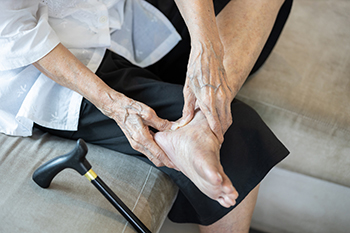
Diabetes can impair a person’s ability to feel differences in temperature or pain in their feet. This is because high levels of blood sugar can cause nerve damage, or diabetic neuropathy. Any little cut, scrape, pressure point or disturbance in the skin that goes undetected has the potential of becoming a more serious wound. Wounds can be dangerous to a person with diabetes because their heightened levels of blood glucose can also restrict circulation in the feet and their body’s ability to heal itself. Daily foot care then becomes essential for the diabetic to stay healthy and to prevent wounds and infections from developing. Feet should be kept clean, but never washed with water hot enough to scald the skin. Moisturizing the skin will help keep skin healthy and prevent it from cracking. Toenails should be kept trimmed straight across, and not too short. Jagged or long nails may cut into skin on surrounding toes, and toenails that are rounded or too short may lead to ingrown toenails. Feet should be inspected at least once a day to make sure no trauma has occurred to the skin. If anything unusual is detected, it is suggested you consult a podiatrist right away. In fact, regular visits with your podiatrist will be an important part of maintaining foot health and preventing wounds and ulcers from developing.
Diabetic foot care is important in preventing foot ailments such as ulcers. If you are suffering from diabetes or have any other concerns about your feet, contact Ronald Pieroni, DPM from Bolingbrook Foot and Ankle Center. Our doctor can provide the care you need to keep you pain-free and on your feet.
Diabetic Foot Care
Diabetes affects millions of people every year. The condition can damage blood vessels in many parts of the body, especially the feet. Because of this, taking care of your feet is essential if you have diabetes, and having a podiatrist help monitor your foot health is highly recommended.
The Importance of Caring for Your Feet
- Routinely inspect your feet for bruises or sores.
- Wear socks that fit your feet comfortably.
- Wear comfortable shoes that provide adequate support.
Patients with diabetes should have their doctor monitor their blood levels, as blood sugar levels play such a huge role in diabetic care. Monitoring these levels on a regular basis is highly advised.
It is always best to inform your healthcare professional of any concerns you may have regarding your feet, especially for diabetic patients. Early treatment and routine foot examinations are keys to maintaining proper health, especially because severe complications can arise if proper treatment is not applied.
If you have any questions please feel free to contact our office located in Bolingbrook, IL . We offer the newest diagnostic and treatment technologies for all your foot and ankle needs.
